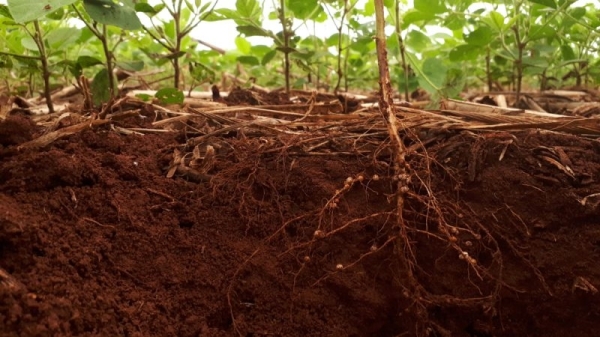NGOs, businesses call for binding targets in new EU soil health law

Ahead of the Commission’s proposal for an EU soil health law expected in June, a coalition of NGOs, progressive farming organisations, and food businesses has called for ambitious and binding measures.
In an open letter to several European Commissioners published on Monday (13 March), around 280 organisations and individuals called on the EU executive to table “an ambitious and progressive” legislative proposal for an EU soil health law.
The new law is set to give soil the same protected legal status as air and water and comes within the framework of the EU’s soil strategy, which was presented in November 2021.
“With the health of European soils rapidly degrading, an ambitious soil health law is urgently needed,” the letter, which was signed by NGOs, farming organisations and academics alongside food industry giants such as Nestlé or Unilever, stresses.
According to the European Commission, 70% of soil in the EU is not in good condition. NABU, the German branch of BirdLife and one of the letter’s coordinators, also pointed to the fact that, in Germany, most agricultural soils currently emit an average of 0.19 tonnes of CO2 per hectare and year, rather than capturing additional carbon.
To effectively counter this and reach the EU executive’s goal of dramatically improving the state of soil by 2050, the letter’s signatories set out a handful of criteria that the law needs to fulfil in their view.
This includes “ambitious and binding targets on achieving soil health”, which should be monitored and enforced through a “strong governance framework” based on a “comprehensive, harmonised and legally anchored soil health monitoring and reporting system”.
Countering soil degradation “can only be achieved with a strong legislative framework that defines soil health in a binding manner and backs it up with measurable indicators,” Michael Berger, policy expert at WWF, said.
Learning from experience
Such targets already exist in the EU for the protection of air and water, through the Air Quality Directive and the Water Framework Directive, respectively.
These legislations set out specific targets for member states, which can be sued if, say, their water or air is more polluted than the EU rules allow. Most recently, for example, the German federal state North Rhine-Westphalia was sued by environmental NGO BUND in February for allegedly not complying with the Water Framework Directive.
The organisations behind the letter hope the new soil law could provide a similar function.
“A legislative framework for soil has the potential to deliver much-needed policy integration and coherence, catalysing the positive socio-ecological and -economic impact of EU policy,” it reads.
In the view of the signatories, much is to be gained from achieving healthy soils.
“Healthy soils are fundamental to achieve the climate, biodiversity, water and zero pollution targets of the European Green Deal, and to support the EU’s Farm to Fork objectives and transition to a sustainable food system,” the letter stresses.

Soils to receive same legal status as air, water in first EU-wide soil health law
The European Union’s soil strategy has outlined plans for a soil health law by 2023 to bring soil on the same legal footing as air and water, and EU lawmakers have warned this must be a hard deadline.
Support and opposition
Despite the fact that the implementation of national binding targets would require investments in an on-the-ground monitoring system, the organisations are convinced that the step would pay off economically.
“While the costs of soil health degradation to society, businesses and biodiversity are exponentially rising, the costs of soil health monitoring and soil health regeneration are rapidly decreasing,” they write.
However, there is also opposition to the push for a unified legal framework on soils at the EU level.
EU farming association COPA-COGECA has previously expressed concerns over the idea of a bloc-wide approach, pointing to the fact that the characteristics of soil in different European regions vary greatly. The organisation also warned of additional red tape for farmers.
Meanwhile, a previous attempt to introduce an EU soil law made by former environment Commissioner Janez Potočnik failed due to opposition from national governments, including, at the time, Germany, France, and the UK.

EU earmarks €320 million for soil health research to contribute to carbon removal
The European Union is stepping up efforts on soil health research with the announcement of a new Horizon Europe mission, which will also provide key funding for the promotion of carbon farming.



